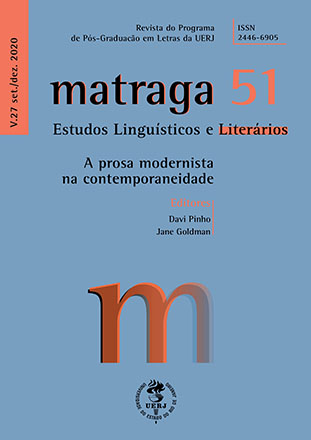A arlequimia em Mário de Andrade: crítica e prática de uma máscara
DOI:
https://doi.org/10.12957/matraga.2020.49553Palavras-chave:
Imaginário, Mário de Andrade, Arlequim.Resumo
Os percursos críticos da Semana de Arte Moderna desencadeiam-se tanto nos textos produzidos pelos intelectuais participantes no debate sobre o caminho da arte na época, como na fortuna crítica que as obras desses intelectuais suscitaram. O presente trabalho é uma interpretação crítica da prática artística de Mário de Andrade que interroga como a apropriação da figura do Arlequim, que atravessa sua obra, é transformada numa proposta estética e num amoldamento de artista. Olhando para o modo como a crítica percebeu o Arlequim dentro da escrita de Mário de Andrade, dialogamos com esses aspectos e propomos uma ampliação do significado dessa figura, pensando nos motivos da escolha dessa máscara por parte do escritor, e vendo-a como fundamento do ato improvisado de escrever e representar uma arte e uma identidade cuja totalidade seria impossível ainda no Brasil. Sob esse ponto de vista, Macunaíma seria um exemplo de arlequimização, cuja feição rapsódica indica já a proximidade com o improvisar de várias fontes símile à prática arlequinal da Commedia dell’arte. O Arlequim, essa figura central e irradiadora de metáforas, guia a poética de Mário de Andrade, realizando o artista nela a simbiose que propõe entre estética, práxis e vida.
Downloads
Downloads
Publicado
Como Citar
Edição
Seção
Licença
AUTORIZAÇÃO
A Matraga – Revista do Programa de Pós-Graduação em Letras da UERJ está autorizada a publicar o artigo ora submetido, caso seja aceito para publicação online. Fica atestado que a contribuição é original, que não está sendo submetida a outro editor para publicação, e que a presente declaração é a expressão da verdade.
Os trabalhos publicados no espaço virtual da Matraga – Revista do Programa de Pós-Graduação em Letras da UERJ serão automaticamente cedidos, ficando os seus direitos autorais reservados à Matraga. Sua reprodução, total ou parcial, é condicionada à citação dos autores e dos dados da publicação.

A Matraga utiliza uma Licença Creative Commons - Atribuição-NãoComercial 4.0 Internacional.





